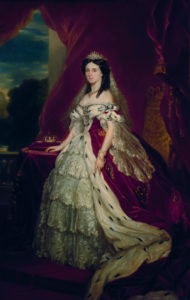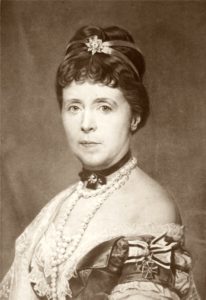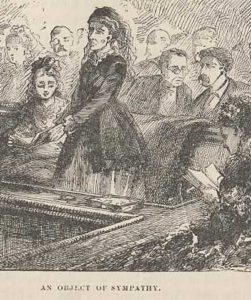
And did Mark Twain mistake the empress for someone else?
Mark Twain’s account of an encounter with Empress Augusta of Germany counts among his most hilarious sketches of Baden-Baden. It appears in A Tramp Abroad, where he recorded his 1878 visit to an English-speaking church in the German resort town.
In the church sat a celebrity: As the wife of Emperor Wilhelm I of Germany, Augusta of Saxe-Weimar-Eisenach (1811-1890) held the titles of Queen of Prussia and Empress of Germany. She was well-connected. Empress Augusta of Germany was Catherine the Great’s great-granddaughter, and her grandson Friedrich married Queen Victoria’s oldest daughter.
And that makes Mark Twain’s description of her particularly puzzling.
Mark Twain and the Empress Augusta of Germany in Baden-Baden’s church
Because his hired coachman was so well dressed, wrote Twain in A Tramp Abroad, “we were probably mistaken for a brace of stray dukes; why else were we honored with a pew all to ourselves, away up among the very elect…. In the pew directly in front of us sat an elderly lady, plainly and cheaply dressed; at her side sat a young lady with a very sweet face, and she also was quite simply dressed; but around us and about us were clothes and jewels which it would do anybody’s heart good to worship in.”

Twain began to feel sorry for the old lady:
I thought it was pretty manifest that the elderly lady was embarrassed at finding herself in such a conspicuous place arrayed in such cheap apparel; I began to feel sorry for her and troubled about her. She tried to seem very busy with her prayer-book and her responses, and unconscious that she was out of place, but I said to myself, “She is not succeeding–there is a distressed tremulousness in her voice which betrays increasing embarrassment.” Presently the Savior’s name was mentioned, and in her flurry she lost her head completely, and rose and curtsied, instead of making a slight nod as everybody else did. The sympathetic blood surged to my temples and I turned and gave those fine birds what I intended to be a beseeching look, but my feelings got the better of me and changed it into a look which said, “If any of you pets of fortune laugh at this poor soul, you will deserve to be flayed for it.” Things went from bad to worse, and I shortly found myself mentally taking the unfriended lady under my protection. My mind was wholly upon her. I forgot all about the sermon. Her embarrassment took stronger and stronger hold upon her; she got to snapping the lid of her smelling-bottle–it made a loud, sharp sound, but in her trouble she snapped and snapped away, unconscious of what she was doing. The last extremity was reached when the collection-plate began its rounds; the moderate people threw in pennies, the nobles and the rich contributed silver, but she laid a twenty-mark gold piece upon the book-rest before her with a sounding slap! I said to myself, “She has parted with all her little hoard to buy the consideration of these unpitying people–it is a sorrowful spectacle.” I did not venture to look around this time; but as the service closed, I said to myself, “Let them laugh, it is their opportunity; but at the door of this church they shall see her step into our fine carriage with us, and our gaudy coachman shall drive her home.”
Then she rose–and all the congregation stood while she walked down the aisle. She was the Empress of Germany!
No–she had not been so much embarrassed as I had supposed. My imagination had got started on the wrong scent, and that is always hopeless; one is sure, then, to go straight on misinterpreting everything, clear through to the end. The young lady with her imperial Majesty was a maid of honor–and I had been taking her for one of her boarders, all the time.
This is the only time I have ever had an Empress under my personal protection; and considering my inexperience, I wonder I got through with it so well. I should have been a little embarrassed myself if I had known earlier what sort of a contract I had on my hands.
We found that the Empress had been in Baden-Baden several days. It is said that she never attends any but the English form of church service.

By F.Jamrath & Sohn Berlin (Kabinet Photo) [Public domain], via Wikimedia Commons.
Truth or tall tale?
With Mark Twain’s travel literature, it’s not always easy to tell. Germans love to say that Twain’s 1878 raft trip down the Neckar River, a travel adventure covering several chapters in A Tramp Abroad, inspired Huckleberry Finn, published just a few years later. But that trip never happened – a fact documented in Twain’s travel journal. His German riparian expedition navigated nothing more than the river of his imagnination.*
On the other hand, one of Twain’s most incredible tales – about a secret passage in the town in Dilsberg, Germany, with its entrance in the town well – turned out to be true. Inspired by Twain’s story to search for it, archaeologists discovered the passage years later. It’s now open to the public and one of Dilsberg’s tourist attractions. Some of Twain’s tall tales do have kernels of truth in them. Twain’s interplay between fact and fiction make him so interesting.
So how much of Twain’s story about Empress Augusta of Germany can we trust?
To answer that, I turned to one of her biographers, Karin Feuerstein-Praßer. She joins us today, not only to insert her historical scalpel between Twain’s fact and fiction, but to introduce us to a woman who wasn’t afraid to buck convention and was fascinating in her own right. You can read about Feuerstein-Praßer’s book, Augusta: Kaiserin und Preußin, below.
Interview with biographer Karin Feuerstein-Praßer

Frau Feuerstein-Praßer, did Empress Augusta of Germany visit Baden-Baden often?
Yes, she came there regularly, especially to meet with her daughter Luise, the Grand Duchess of Baden.
Did she worship at the English church there?
That hasn’t been precisely documented, but it’s entirely possible. Augusta had – much to the regret of her subjects – a preference for all things English (and French), which one can see in her reading material. Although she grew up to a certain extent under Goethe’s wing, German literature hardly interested Augusta at all.
Where would she have sat in the church?
Augusta was a very status-conscious lady who always avoided contact with “ordinary” people. She would have never mixed with “normal” visitors in the church, but would have taken a separate place of honor.
Was Empress Augusta of Germany very religious? Would it be in character for her to curtsey at the name of the Savior instead of inclining her head like everyone else?
Yes, August was indeed a deeply religious woman who interpreted her Protestant faith in her own fashion. As a child, she often accompanied her mother, Maria Pavlovna, to Russian Orthodox services and loved its mystical atmosphere, redolent with incense. The Protestant faith was much too sterile for her; she missed the sensual experience, the spirituality. For this reason, it’s possible that Augusta curtsied during the service, perhaps as a reflex from her childhood, but perhaps it was also a gesture with which she wanted to express her own conviction. Whenever Augusta took leave of her children, for example, she blessed them with the sign of the cross, which was in no way usual for Protestants.
Was she a member of the Pietist movement?
No, definitely not. Like I said, she tended towards Catholicism, and her opponents even accused her of having secretly converted to the Catholic faith. That, of course, is complete nonsense.

Twain says she snapped her smelling bottle a lot. Was she known to carry a smelling bottle and use it?
Smelling bottles like that were actually more for temperamental ladies who wanted to call attention to themselves. Augusta was exactly the opposite. She was a dutiful and disciplined woman through and through who would have never allowed the public to see her human weaknesses. Her use of a smelling bottle is thus extremely unlikely. And if she did use one, then Augusta would have never “played” with it during a church service.
You describe in your book how Augusta wasn’t feminine enough for the emperor. Was her dress unfeminine or inelegant?
When Wilhelm married Augusta, he was already a man of ample erotic experience. He had hoped to find a sensual partner in Augusta, but the exact opposite was the case. She was cool and disciplined in bed. Sex didn’t appear to be much fun for her. In his letters, Wilhelm always complained of Augusta’s “lack of femininity.” But that didn’t apply to her clothing, in fact, the opposite was true. Already as a young woman, Augusta was very fashion-conscious, and for the somewhat conservative Prussian royal house, way too fashion-conscious. It annoyed Wilhelm that his wife had to follow every trend, and he hoped that would blow over with time. She was only 17 years old when they got married.
Do you think it’s at all possible that Mark Twain could mistake Empress Augusta of Germany for a poor woman?
I consider it absolutely inconceivable. The period reports all emphasize that Augusta was invariably attired to perfection and with elegance. She used cosmetics, valued a well-fitting hairstyle, and wore jewelry – and all that into her old age. It is of course possible that she selected more ordinary clothing for her church visit, but nevertheless, representation of “majesty” was important to her, everywhere and at all times. There was absolutely nothing folksy about her.
Thank you, Frau Feuerstein-Praßer!
Have you ever encountered a celebrity without knowing who they were? It’s happened to me!
Literature on point:
Mark Twain, A Tramp Abroad, ch. XXIV (public domain)
Mark Twain, Notes and Journals
Karin Feuerstein-Praßer, Augusta: Kaiserin und Preußin (Munich: Piper Verlag, 2015)
*Richard Bridgman, Traveling in Mark Twain ((Berkeley: Univ. of California Press, 1987) 100.
About the book, Augusta: Kaiserin und Preußin: When the Princess Augusta of Saxe-Weimar-Eisenach married the Prussian Prince Wilhelm, she had no idea she would one day become the first empress of Germany. Raised in the cultural atmosphere of Goethe’s era, she was highly educated and had pronounced appreciation for art. Only with the Revolution of 1848 did she step into the spotlight of history: As the liberal wife of the Prussian king and later emperor, she sought to influence her husband’s conservative politics. But she had a powerful enemy in Otto von Bismark, whose military plans to unite Germany were hated by the staunch pacifist.
Piper Verlag, 320 pages. Unfortunately available only in German.
The author, Karin Feuerstein-Praßer, ist a freelance historian in Germany and author of numerous biographies.





That Samuel Clemens wasn’t a guy to be trusted. Not with the facts, but his read of human nature was damned good.
I wonder what he was up to.
Thanks for a Twain story, an interesting interview, and your engaging enjoyment of these human puzzles.
Twain isn’t always to be trusted, unless you are looking for a laugh. Then you can count on him! Thanks for commenting, Elaine. I’m glad you enjoyed the post.
That was very interesting! It’s just like Mark Twain though to mix the truth in with fiction to tell his story!
Yes, I agree! And that’s one of the things that makes him so interesting. Thanks for commenting, Susan!
[…] You might also enjoy reading about Mark Twain’s visit to Baden-Baden several years later and his encounter with the Prussian empr…. […]